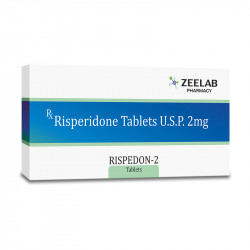Risperidone
Introduction
Risperidone is an atypical antipsychotic medication used to treat various mental health disorders, including schizophrenia, bipolar disorder, and irritability associated with autism. It helps balance certain brain chemicals, improving mood, thinking, and behavior. Risperidone is available in tablet, liquid, and injectable forms, making it suitable for different patient needs. This medication must be taken under a doctor`s supervision, as improper use may lead to side effects. Regular monitoring and dosage adjustments ensure its effectiveness while minimizing potential risks. Risperidone has been widely prescribed for its efficacy in managing psychotic symptoms and mood disorders.
Available Medicine for Risperidone
Uses of Risperidone
- Treatment of schizophrenia
- Management of bipolar disorder (manic or mixed episodes)
- Helps reduce irritability in children with autism
- Controls aggression and mood swings
- Prevents relapse in chronic psychiatric conditions
How Risperidone Works
Risperidone works by modulating dopamine and serotonin levels in the brain. It blocks specific receptors, reducing excessive dopamine activity, which is linked to hallucinations and delusions in schizophrenia. Additionally, its effect on serotonin receptors helps stabilize mood and reduce aggression in bipolar disorder and autism-related symptoms.
Benefits of Risperidone
- Effectively reduces psychotic symptoms
- Improves mood and emotional stability
- Reduces aggressive and impulsive behavior
- Available in multiple forms for ease of use
- Helps prevent relapses in chronic psychiatric conditions
How to Take Risperidone
Risperidone should be taken exactly as prescribed by a doctor. It is usually taken once or twice daily, with or without food. The tablet should be swallowed whole with water. If using the liquid form, measure the dose accurately. Do not stop taking the medication suddenly, as it may worsen symptoms.
Type of Dosage Available
- Risperidone 0.5mg tablets
- Risperidone 1mg tablets
- Risperidone 2mg tablets
- Risperidone 3mg tablets
- Risperidone 4mg tablets
- Risperidone oral solution
- Risperidone long-acting injectable
Side Effects of Risperidone
- Common side effects: Drowsiness, dizziness, weight gain
- Increased appetite
- Tremors or muscle stiffness
- Changes in blood pressure
- In rare cases, high blood sugar or cholesterol levels
- Risk of movement disorders with prolonged use
Safety Advice
- Avoid alcohol, as it may increase drowsiness
- Not recommended for elderly patients with dementia
- Use caution if you have diabetes or heart disease
- Regular medical checkups are necessary for long-term use
- Consult your doctor before stopping the medication
Frequently Asked Questions (FAQs)
Q: How long does Risperidone take to work?
A: It may take a few days to weeks to notice improvements in symptoms.
Q: Can Risperidone be used for anxiety?
A: It is primarily used for schizophrenia and bipolar disorder but may help with severe anxiety in some cases.
Q: Is Risperidone safe for long-term use?
A: Yes, but regular monitoring by a doctor is essential to prevent side effects.
Related Salt
Disclaimer : Zeelab Pharmacy provides health information for knowledge only. Do not self-medicate. Always consult a qualified doctor before starting, stopping, or changing any medicine or treatment.
Download India's most affordable pharmacy app
- Compare with medicine prices
- Save upto 90% on your medicine bills

Temperature Controlled storage and delivery

Regular Sanitization

Disinfected Packaging















 Added!
Added!